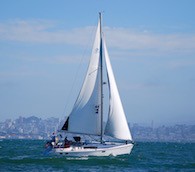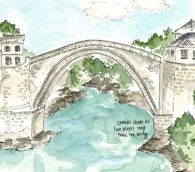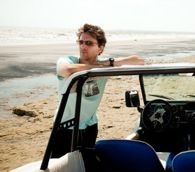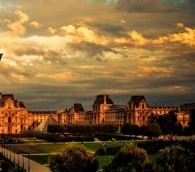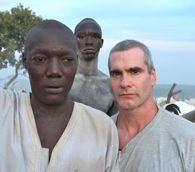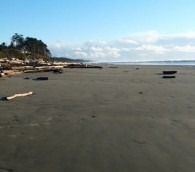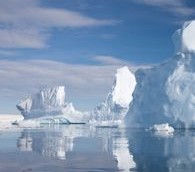Tag: Why We Travel
Riding the Slot
by Lenore Greiner | 03.19.16 | 12:09 PM ET
As she struggled to make sense of her father's final days, Lenore Greiner sailed across a treacherous patch of San Francisco Bay
Why I Travel: My #YesAllWomen
by Amy Gigi Alexander | 06.05.14 | 11:43 AM ET
After she was raped, Amy Gigi Alexander couldn't even leave the house. Now, she travels the world solo. Here's why.
Drawing Connections in Mostar
by Candace Rose Rardon | 05.30.14 | 9:12 AM ET
Candace Rose Rardon began sketching in Bosnia to better remember the place. But something else happened along the way.
A Bridge Not Too Far
by Peter Ferry | 03.01.14 | 1:25 PM ET
On a sunny summer day, novelist Peter Ferry bikes to a Dutch bridge where hundreds of soldiers perished
Clear-Eyed in Calcutta
by Andrew McCarthy | 12.19.13 | 3:02 PM ET
Andrew McCarthy closed his eyes the moment before the blade hit the goat's neck. Afterward, he knew just what he had to do.
Interview with Andrew McCarthy: A ‘Strange Second Act’
by Jim Benning | 10.09.12 | 8:53 AM ET
Jim Benning asks the actor, director and writer about his new book and his second career in travel writing
Video: Lisa Napoli in Conversation with Eric Weiner
by Jim Benning | 05.18.12 | 2:01 PM ET
World Hum contributors Lisa Napoli and Eric Weiner spoke in front of a live audience recently in Santa Monica. Napoli, of course, is the author of “Radio Shangri-La,” about her experience in Bhutan. Weiner wrote “The Geography of Bliss” and “Man Seeks God.” Their wide-ranging discussion touched on Bhutan, happiness, authenticity and spirituality, among other things. This 30-minute video has some highlights.
‘Paris Was the Landscape of What I Wanted to Be’
by Eva Holland | 04.12.12 | 12:51 PM ET
In the latest essay in The Rumpus’ “The Last City I Loved” series, writer Rebekkah Dilts looks back on her time as a foreign student in Paris. Here’s a taste:
Speaking and being spoken to in French, this language that’s like a song, opened a new vein of cognition and a different sensibility in me. Paris was the landscape of what I wanted to be: I wanted to have a history that I believed in fiercely, I wanted for art and words to be acknowledged, but also for softness and aesthetics to be appreciated. And I was embraced by a family again; to feel tenderness and a sense of belonging in the setting of so incredible a city was the greatest gift I could have been given. I felt a unique and profound freedom.
Interview with Lisa Napoli: ‘Radio Shangri-La’ in Bhutan
by Jim Benning | 04.10.12 | 11:16 AM ET
Jim Benning asks the author about her memoir and how the Himalayan kingdom changed her
A Street Corner in Paris
by Jeffrey Tayler | 01.30.12 | 11:22 AM ET
Jeffrey Tayler had all but given up on the City of Light. Then he sat down at a Left Bank cafe.
Tom Bodett’s ‘Inside Passage’
by Michael Yessis | 01.10.12 | 11:31 PM ET
Brave and amazing storytelling in this Moth podcast by Tom Bodett, who recounts a low point in his life—he nearly blew himself up on a power line—and how he emerged from it with a realization about his father and a beautiful reason to go to Alaska. He writes about telling the story on his blog:
Standing on that stage in Burlington and telling such a personal tale, almost a confessional, in front of 1500 strangers was one of the highlights of my performing life. Until the moment I walked in front of the microphone a big part of me thought I was making a mistake. It was too personal. It was too revealing of a very low point in my character. It would make me choke up.
It was all those things and more and has made me very happy.
Made me choke up, too.
Interview with Henry Rollins: Punk Rock World Traveler
by Jim Benning | 11.02.11 | 12:40 PM ET
Jim Benning asks the musician about his new book of photographs and how travel has humbled him
Is the ‘Madness’ of Travel in our DNA?
by Michael Yessis | 09.07.11 | 10:49 AM ET
Elizabeth Kolbert’s New Yorker story about Svante Paabo’s quest to sequence the Neanderthal genome contains a theory about why humans travel and seek the unknown. Kolbert notes that the archeological record shows Neanderthals’ migration stopped “when they reached water or some other significant obstacle,” while “archaic humans” pushed past those barriers, across open water and beyond. Paabo, writes Kolbert, seeks to “identify the basis for this ‘madness’ by comparing Neanderthal and human DNA.”
Paabo explains:
It’s only modern humans who start this thing of venturing out on the ocean where you don’t see land. Part of that is technology, of course; you have to have ships to do it. But there is also, I like to think or say, some madness there. You know? How many people must have sailed out and vanished on the Pacific before you found Easter Island? I mean, it’s ridiculous. And why do you do that? Is it for the glory? For immortality? For curiosity? And now we go to Mars. We never stop.
He adds:
If we one day will know that some freak mutation made the human insanity and exploration thing possible, it will be amazing to think that it was this little inversion on this chromosome that made all this happen and changed the whole ecosystem of the planet and made us dominate everything.
He also tells Kolbert:
We are crazy in some way. What drives it? That I would really like to understand. That would be really, really cool to know.
Fascinating.
Unfortunately, only an abstract of the story is online. There is, however, a Q&A with Kolbert.
David Brooks on Travel and the Haimish Line
by Jim Benning | 08.30.11 | 4:32 PM ET
The New York Times columnist recently took his family on safari to Kenya and Tanzania. They stayed in simple camps where they got to know people and more luxurious camps where they did not.
The more elegant camps felt colder. At one, each family had its own dinner table, so we didn’t get to know the other guests. The tents were spread farther apart. We also didn’t get to know the staff, who served us mostly as waiters, the way they would at a nice hotel.
I know only one word to describe what the simpler camps had and the more luxurious camps lacked: haimish. It’s a Yiddish word that suggests warmth, domesticity and unpretentious conviviality.
It occurred to me that when we moved from a simple camp to a more luxurious camp, we crossed an invisible Haimish Line. The simpler camps had it, the more comfortable ones did not.
Brooks goes on to extrapolate larger lessons about how we live. It’s a well-worn theme in travel—see Rick Steves and a thousand other sources. But the message never gets old, undoubtedly because most advertising continues to insist we’ll be happier if we just spend more money.
On Coastal Time
by Pam Mandel | 08.19.11 | 11:07 AM ET
Years pass. Life changes. But for Pam Mandel, one thing stays the same: her love for the Olympic Peninsula.
Videos You Must See: Move, Learn, Eat
by Eva Holland | 08.06.11 | 9:56 AM ET
Edith Zimmerman from The Hairpin summarizes these three gorgeous travel shorts thusly: “Three beautiful, infuriating young men had enough time and money to go everywhere, eat everything, and turn it into three little movies. Go to hell, beautiful young men!”
“Move” is my favorite. “Learn” and “Eat” are below the jump.
MOVE from Rick Mereki on Vimeo.
Meditation at Stinson Beach
by Jim Benning | 07.27.11 | 11:00 AM ET
Don George recently visited a favorite northern California beach.
I let the sea wash over me, let the waves fill my head and lungs, lose myself to this inconceivably old and ageless place.
I think: This is the same scene I witnessed two decades ago, quite possibly even the same rock I sat on then, scribbling in my journal as I tap into my laptop now. And if I come back in 20 years, it will almost certainly be the same still.
But of course, much has changed in those two decades. My children have grown up and moved on. My Dad and other loved ones have passed away. New jobs, new places, new books, old dreams.
And suddenly these words flow into my brain: Where does it all come together? What does it mean?
‘Traveling to Europe Didn’t Change My Life’
by Michael Yessis | 03.23.11 | 3:28 PM ET
A contrarian take on the power of travel at Thought Catalog. Caitlin Rolls writes:
Travel is supposed to be this other-worldly experience. People always start looking all moony when they mention their travels, like suddenly they’re back in that musky tent in Morocco wrapped up in the paisley sarong they bought because they just, you know, really wanted to live it. They’ll explain that it was a really amazing experience that they can’t exactly put into words so why don’t they just show you the slide show they set to the music of Ravi Shankar? Super moving stuff but maybe the reason they don’t want to talk about it is because they’re afraid to admit that they came home exactly the same person they were when they left.
Of course, the sentiment has polarized the commentariat.
The Power of Personal Landmarks
by Chris Epting | 11.04.10 | 1:00 PM ET
Forget grand historical monuments for a moment. Chris Epting celebrates the unheralded places meaningful to each of us.
See the full audio slideshow: »
Words Are Like Icebergs
by Frank Bures | 09.21.10 | 11:06 AM ET
Frank Bures on the pleasures of traveling and learning foreign languages
- « Prev Page
- Next Page »
